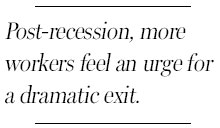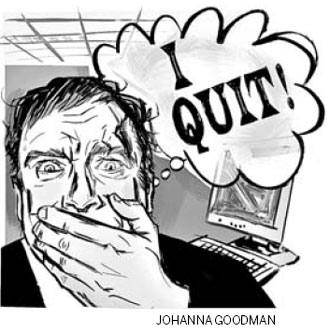Quitting suddenly is usually a bad idea
Updated: 2013-04-21 07:49
(The New York Times)
|
|||||||||
"I quit!"
What beleaguered worker hasn't fantasized about saying those words and walking out the door? Wisely, most don't go that far, at least not then and there.

It's fairly common to feel a passing urge to quit your job when you've hit a rough patch, says Nancy S. Molitor, a psychologist and public education coordinator for the American Psychological Association. But she said the idea is surfacing in more employees' minds these days.
Many of her clients have acquiesced at their jobs over the last five or six years, just grateful to be employed in an uncertain economy, Dr. Molitor said. Some were promised raises or bonuses once the recession ended, but now that better times have arrived, companies are withholding those rewards, she said.
Sometimes an employee wants to quit because of an untenable working situation: an overbearing boss, a difficult co-worker, a crushing workload. Often, the reasons for wanting to quit are legitimate, Dr. Molitor said.
But resigning has huge consequences, so you never want to make that decision while in the grip of intense emotion, she said. Wait a week. Discuss your feelings with a friend, family member or therapist. Colleagues may understand office politics, she said, but make sure you trust them to keep your confidence.
If you find yourself thinking the same thoughts about your job over and over again, "that's a huge red flag," she said. You are reacting to pure adrenaline and emotion. Take some time to calm down, and if necessary seek professional help. If you feel you are in danger of quitting suddenly, take a day off to clear your head, she advised.

Once you have separated emotion from reality, you may be able to find a way to change your work situation so that it's no longer intolerable, Dr. Molitor said.
Many employees need to work harder at advocating for themselves, she said. If you felt that you deserved a raise and didn't get one, try asking for one and you might succeed, she said.
After careful consideration, you may determine that your only option is to resign, but do so politely, and with plenty of notice. If you quit suddenly and make a dramatic exit, you can probably forget about using your employer as a reference, and word will spread that you left your company in a troubled situation.
Suzanne Lucas, a former human relations professional, says in a column for CBS News that it's generally a bad idea and "just darn rude" to quit a job on the spot. But she notes exceptions that would justify a quick departure - for example, if staying in a job would put you in danger (a violent co-worker, say, or a safety violation), or would make you break the law or violate your ethical or religious standards.
In most cases, though, you can give notice. Just try to be gracious, because "how you end things is incredibly important," said Robert I. Sutton, a professor and an organizational psychologist at Stanford University in California.
"I'm a big fan of quitting," Professor Sutton said, so long as it's done for the right reasons and in the right way.
The New York Times

(China Daily 04/21/2013 page10)